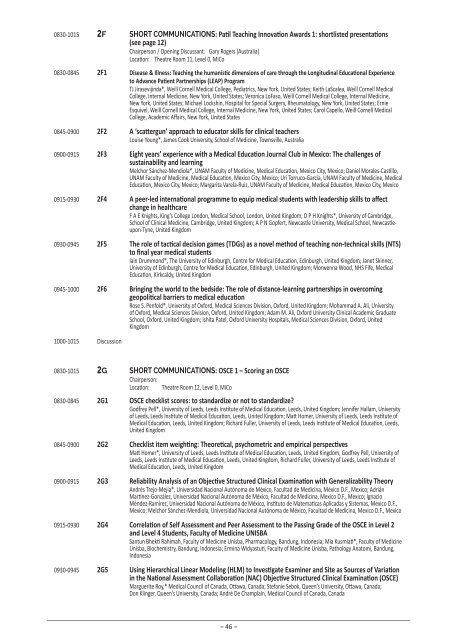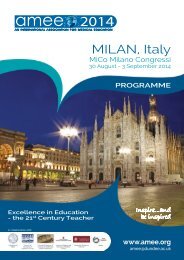Ac1xd
Ac1xd
Ac1xd
You also want an ePaper? Increase the reach of your titles
YUMPU automatically turns print PDFs into web optimized ePapers that Google loves.
0830-1015 2F SHORT COMMUNICATIONS: Patil Teaching Innovation Awards 1: shortlisted presentations(see page 12)Chairperson / Opening Discussant: Gary Rogers (Australia)Location: Theatre Room 11, Level 0, MiCo0830-0845 2F1 Disease & Illness: Teaching the humanistic dimensions of care through the Longitudinal Educational Experienceto Advance Patient Partnerships (LEAP) ProgramTJ Jirasevijinda*, Weill Cornell Medical College, Pediatrics, New York, United States; Keith LaScalea, Weill Cornell MedicalCollege, Internal Medicine, New York, United States; Veronica LoFaso, Weill Cornell Medical College, Internal Medicine,New York, United States; Michael Lockshin, Hospital for Special Surgery, Rheumatology, New York, United States; ErnieEsquivel, Weill Cornell Medical College, Internal Medicine, New York, United States; Carol Capello, Weill Cornell MedicalCollege, Academic Affairs, New York, United States0845-0900 2F2 A ‘scattergun’ approach to educator skills for clinical teachersLouise Young*, James Cook University, School of Medicine, Townsville, Australia0900-0915 2F3 Eight years’ experience with a Medical Education Journal Club in Mexico: The challenges ofsustainability and learningMelchor Sánchez-Mendiola*, UNAM Faculty of Medicine, Medical Education, Mexico City, Mexico; Daniel Morales-Castillo,UNAM Faculty of Medicine, Medical Education, Mexico City, Mexico; Uri Torruco-García, UNAM Faculty of Medicine, MedicalEducation, Mexico City, Mexico; Margarita Varela-Ruiz, UNAM Faculty of Medicine, Medical Education, Mexico City, Mexico0915-0930 2F4 A peer-led international programme to equip medical students with leadership skills to affectchange in healthcareF A E Knights, King’s College London, Medical School, London, United Kingdom; D P H Knights*, University of Cambridge,School of Clinical Medicine, Cambridge, United Kingdom; A P N Gopfert, Newcastle University, Medical School, Newcastleupon-Tyne,United Kingdom0930-0945 2F5 The role of tactical decision games (TDGs) as a novel method of teaching non-technical skills (NTS)to final year medical studentsIain Drummond*, The University of Edinburgh, Centre for Medical Education, Edinburgh, United Kingdom; Janet Skinner,University of Edinburgh, Centre for Medical Education, Edinburgh, United Kingdom; Morwenna Wood, NHS Fife, MedicalEducation, Kirkcaldy, United Kingdom0945-1000 2F6 Bringing the world to the bedside: The role of distance-learning partnerships in overcominggeopolitical barriers to medical educationRose S. Penfold*, University of Oxford, Medical Sciences Division, Oxford, United Kingdom; Mohammad A. Ali, Universityof Oxford, Medical Sciences Division, Oxford, United Kingdom; Adam M. Ali, Oxford University Clinical Academic GraduateSchool, Oxford, United Kingdom; Ishita Patel, Oxford University Hospitals, Medical Sciences Division, Oxford, UnitedKingdom1000-1015 Discussion0830-1015 2G SHORT COMMUNICATIONS: OSCE 1 – Scoring an OSCEChairperson:Location: Theatre Room 12, Level 0, MiCo0830-0845 2G1 OSCE checklist scores: to standardize or not to standardize?Godfrey Pell*, University of Leeds, Leeds Institute of Medical Education, Leeds, United Kingdom; Jennifer Hallam, Universityof Leeds, Leeds Institute of Medical Education, Leeds, United Kingdom; Matt Homer, University of Leeds, Leeds Institute ofMedical Education, Leeds, United Kingdom; Richard Fuller, University of Leeds, Leeds Institute of Medical Education, Leeds,United Kingdom0845-0900 2G2 Checklist item weighting: Theoretical, psychometric and empirical perspectivesMatt Homer*, University of Leeds, Leeds Institute of Medical Education, Leeds, United Kingdom, Godfrey Pell, University ofLeeds, Leeds Institute of Medical Education, Leeds, United Kingdom, Richard Fuller, University of Leeds, Leeds Institute ofMedical Education, Leeds, United Kingdom0900-0915 2G3 Reliability Analysis of an Objective Structured Clinical Examination with Generalizability TheoryAndrés Trejo-Mejía*, Universidad Nacional Autónoma de México, Facultad de Medicina, México D.F., Mexico; AdriánMartínez-González, Universidad Nacional Autónoma de México, Facultad de Medicina, Mexico D.F., Mexico; IgnacioMéndez-Ramírez, Universidad Nacional Autónoma de México, Instituto de Matematicas Aplicadas y Sistemas, Mexico D.F.,Mexico; Melchor Sánchez-Mendiola, Universidad Nacional Autónoma de México, Facultad de Medicina, Mexico D.F., Mexico0915-0930 2G4 Correlation of Self Assessment and Peer Assessment to the Passing Grade of the OSCE in Level 2and Level 4 Students, Faculty of Medicine UNISBASantun Bhekti Rahimah, Faculty of Medicine Unisba, Pharmacology, Bandung, Indonesia; Mia Kusmiati*, Faculty of MedicineUnisba, Biochemistry, Bandung, Indonesia; Ermina Widyastuti, Faculty of Medicine Unisba, Pathology Anatomi, Bandung,Indonesia0930-0945 2G5 Using Hierarchical Linear Modeling (HLM) to Investigate Examiner and Site as Sources of Variationin the National Assessment Collaboration (NAC) Objective Structured Clinical Examination (OSCE)Marguerite Roy,* Medical Council of Canada, Ottawa, Canada; Stefanie Sebok, Queen’s University, Ottawa, Canada;Don Klinger, Queen’s University, Canada; André De Champlain, Medical Council of Canada, Canada– 46 –



